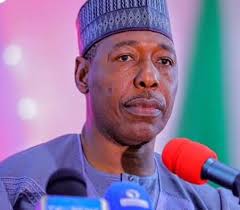Governor Zulum Faces Allegations of Marginalising Christians in Borno
Governor Zulum Faces Allegations of Marginalising Christians in Borno
Governor Babagana Zulum of Borno State has come under fresh criticism amid allegations of systematic exclusion of Christians from politics, academia, civil service, and state-led resettlement programmes in the conflict-ravaged state.
Sources allege that despite Christians making up an estimated 20–30 percent of Borno’s population—particularly concentrated in the southern zone—the administration routinely sidelines them from senior positions and meaningful representation.
The accusations come against a backdrop of longstanding religious tensions in the state, raising concerns over equity, governance, and the fragile balance between communities still recovering from insurgency.
Reports claim that while Christians are occasionally appointed to token roles such as members of the Christian Pilgrims Board or given minor commissioner portfolios, the most influential offices—including Secretary to the State Government, Accountant General, and ministries such as Finance, Education, and Works—are consistently reserved for Muslims.
Political Exclusion Allegations
Tensions reportedly deepened during the 2023 senatorial primaries in southern Borno. Mr. Tarpaya Asarya, a Christian politician with strong grassroots support, had declared his intention to contest under the All Progressives Congress (APC) against incumbent Senator Ali Ndume.
According to insiders, Ndume’s allies petitioned Governor Zulum, branding Asarya an “infidel.” The matter was allegedly escalated to then-APC National Chairman Abdullahi Adamu and former Borno governor Kashim Shettima, who intervened to block Asarya from contesting.
Instead, Asarya was redirected to vie for a House of Representatives seat, which he lost amid widespread protests from constituents who insisted he was their preferred senatorial candidate. Ndume was subsequently awarded the APC senatorial ticket unopposed, in what critics described as a manipulated process.
On election day, the results were controversially announced in Maiduguri rather than the senatorial zone headquarters, with officials citing security concerns. Ndume was declared winner against PDP’s Satumari Milnda Haske, also a Christian, despite resistance from local voters.
Education and Civil Service
The governor has also been accused of manipulating academic and administrative appointments in ways that disadvantage Christians. At Borno State University, Professor Haruna Dlakwa, a respected Christian scholar from Hawul, was reportedly overlooked for the vice-chancellorship despite being the most senior candidate after serving as acting VC. Instead, the role went to a less experienced Kanuri Muslim, prompting Dlakwa’s resignation.
Similar concerns were raised at the School of Health and Midwifery, where the Deputy Provost—a Christian from southern Borno—was denied the opportunity to act as Provost when her superior’s tenure expired. Rather than following civil service rules, Governor Zulum allegedly appointed an external Kanuri Muslim woman to the position.
Critics further accuse the administration of prioritising Islamic schools in Christian-majority areas like Uba in Askira/Uba Local Government, while neglecting secular schools in urgent need of funding and development.
Unequal Resettlement
Christian-majority communities in Gwoza, Chibok, Damboa, and Askira/Uba are also said to have been sidelined in post-insurgency resettlement programmes. Residents claim that while Muslim-majority towns benefit from new housing, cash assistance, and agricultural inputs, Christian villages remain neglected, with displaced families unable to return to their ancestral homes years after Boko Haram’s devastation.
One source described the disparity as “deliberate,” saying Christian children are left without access to functional schools while entire communities remain in ruins.
Broader Concerns
For critics, the allegations point to a troubling pattern of exclusion that risks undermining fragile interfaith relations in a state already scarred by over a decade of extremist violence. They argue that such practices, if unchecked, could deepen distrust, hinder reconciliation, and weaken Borno’s long-term stability.
Governor Zulum has yet to respond to the allegations.
By Haruna Yakubu Haruna

















